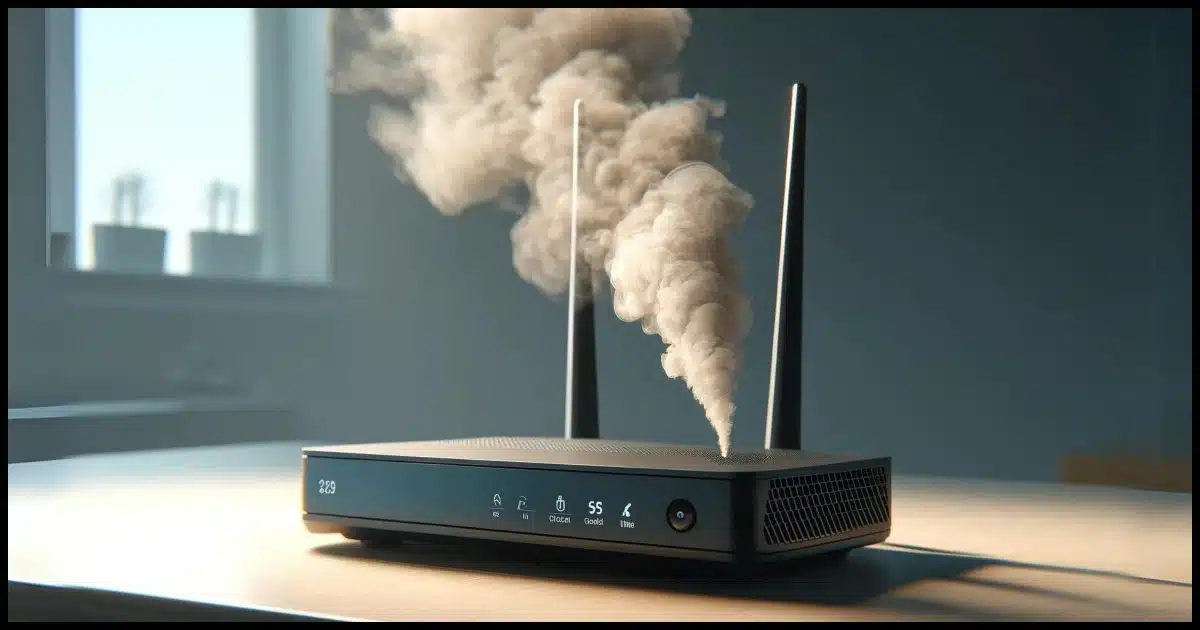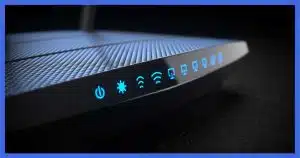A list of eight things to check.

Internet connection drops and failures are frustrating. They always seem to happen at the worst possible time.
Unfortunately, so many things can cause various types of failure that even the diagnostic process can get frustrating.
I’ll review some of the common things to look at if your internet connection randomly stops working.
Become a Patron of Ask Leo! and go ad-free!

An internet connection that randomly stops working
Internet connectivity issues are common and can be caused by router overload, overheating, bugs, too many devices, weak Wi-Fi signals, hardware or software problems, or ISP issues. Troubleshooting steps include restarting your router, checking device and router capacity, updating firmware, and ensuring strong Wi-Fi signal strength.
First, try this
Find your router and unplug it.
Wait 30 seconds.
Now plug it in again.
Give it some time to restart and re-establish your network.
You also might consider rebooting the computer you’re trying to use.
Even though we don’t yet know the cause, “turn it off and back on again” is a time-tested first step that resolves issues in an amazing number of cases.
Having tried that, let’s look at other issues that might be causing your internet connection to drop: router overload, router overheating, router bugs, too many devices on the same internet connection, Wi-Fi strength, hardware issues, software issues, and ISP issues.
1. Router overload
It’s possible that your router isn’t up to the tasks you’re asking it to do. It’s not uncommon for a router to have been installed when there were only a couple of computers involved. Now streaming devices, gaming devices, internet-of-things devices, and more have been added to it.
A router is a small computer. Just like our other computers, what was powerful enough when we bought it might not be anymore. Originally, the router had a fairly boring job maintaining your computer’s connections; now it’s working its little chips off trying to keep up with everything communicating on the internet. One symptom might be dropped connections.
2. Router overheating
Put your hand on the router.
Does it feel hot? Really hot? I’d expect it to perhaps be warm (though most are coolish) but if it feels very hot, it’s possible your router is overheating.
That could be from overload, but more commonly it’s because the router’s ventilation is blocked. Some routers have fans, but many do not, relying on the free flow of air around the device. Make sure your router’s ventilation isn’t blocked.
3. Router bugs
As I said, a router is a small computer, and like any software-driven device, there can be bugs. Sometimes those bugs aren’t made apparent until the router has been running a long time or reaches some maximum threshold of connected devices or throughput.
One thing to consider is to check with the router’s manufacturer and see if there are any software (also called firmware) updates for your device.
4. Too many devices accessing the internet at once
There’s having too many devices connected to the router, which I discussed above, but there’s also a scenario that happens if they’re all trying to make heavy use of your internet connection at the same time. If you’re downloading a large file while someone else is playing an online game and someone else is streaming video, those demands all add up to stress your internet connection.
Depending on the speed of that connection (and, to be honest, the capabilities of your router), trying to do too much online at the same time can result in connection issues.
5. Wi-Fi signal strength and interference
If you’re using Wi-Fi, its signal strength is important to a successful internet connection, and if it’s compromised, you can experience drops. Wi-Fi is sensitive to many issues.
- Distance. The closer your computer is to the Wi-Fi antenna, the better.
- Frequency and channel interference from other devices using Wi-Fi at the same time.
- Electrical interference from other devices in the home can cause radio noise on Wi-Fi frequencies.
- Signal blockage from large metal objects, including metal construction in some walls.
- Antenna size and issues. Generally, a larger antenna is preferable. In some cases, damaged antennas can seriously impact Wi-Fi signal strength.
All these issues can manifest in many ways, including occasional connection drops.
6. Other hardware issues
A surprisingly common problem for wired connections mimics what I mentioned above about Wi-Fi antenna damage. If an ethernet cable is damaged, it may not fail completely but may instead cause the connection to be slow or even intermittent.
Particularly if the problem seems centered on one machine that is connected to your router via an ethernet cable, try replacing that cable with a new one.
7. Software issues
Many things on your computer can affect your connection. Your security software, a VPN if you use one, and other network management software all have the potential to affect what happens.
Similarly, incorrect network settings can have odd impacts. One approach to this possibility is to uninstall the driver for your network adapter and let Windows reinstall it with default settings. Checking with the network adapter’s manufacturer for updated drivers might also be a good step.
8. ISP
It’s the thing most people jump to first, but you’ll notice it’s last on my list.
Yes, your ISP might be having a problem of some sort. That could range from issues at the ISP’s location to any of the equipment that connects your location to its servers.
Most of the time, items 1 – 7 above will cover the cause of your troubles, but if they don’t seem to be the cause of the problem, then a call to your ISP to see if they’re experiencing a problem or can help you diagnose the problem might be worth the effort.
Do this
Connectivity issues can be both frustrating and difficult to diagnose. I hope the list of things above helps you resolve whatever issues you might be experiencing.
Here’s something that’s not frustrating (at least I don’t think so!): subscribe to Confident Computing! Less frustration and more confidence, solutions, answers, and tips in your inbox every week.





Great article!
There are a couple of things I also do, as our internet can be very slow sometimes.
As you wrote we tend to blame the ISP first. But I don’t call them I do a speed test, I believe nearby neighbors on the same ISP may slow the whole lot down. This problem, hopefully, will soon pass. Our download numbers vary throughout the day.
Now, you may tell me this is unnecessary, but I also reboot the modem whenever I reboot the router. And I do both every month or so as a preventive maintenance.
The other thing we are able to do with our set up, is when possible we run many IoT, like streaming, on ethernet cable.
You wrote to check ethernet cables. I have found the flat cables with a longer rubbery connection from the cable to the connector are best. We were always replacing the round, cheaper ones because they had failed. The flat ones are still going strong. I also understand older lower CAT number cables might not be up to the job, and should be replaced.
Have a little think, have you added something fairly recently? A huge issue we have just “solved” was in setting up our new Ooma VOIP service, they recommend the Telobox be between the modem and router. We found this slowed our usual 300 plus mbps download speed to 98 mbps as now everything was going through their box that had that limit. Luckily, because this new set up caused issues immediately we realized the cause of the issue and solved it by moving the Telobox on to the router and all is well. Incidentally I was also concerned about the security of all our traffic going through their box before the firewall.
We also add little rubber feet to anything that cools underneath, helping to dissipate the heat faster.
As always, you guys get me thinking, and give me the knowledge to solve many “baffling” things. Thank you.
I have a Wireless Access Point (WAP) 2 rooms away from my bedroom streaming computer. I’ve done a lot of tweaking to reduce the disconnects and slow connection. I did a few thing that improved the situation a lot. I Got a WAP with 3 antennas, I added a USB WiFi adapter with 2 antennas to my computer and disabled the internal WiFi card. I lowered the adapter and WAP so that they are ad door level so they don’t have to pass through walls. I set the WiFi frequency to 2.4 GH. I still have an occasional disconnect. I recently read that putting aluminum foil behind the WAP can help. I’ll do that tonight and see.
(This is just me being fussy. No need to publish.)
In point 8, you say “Most of the time, items 1 – 8 above will cover the cause of your troubles…” – shouldn’t this read “items 1-7 above”?
Good catch. I changed it.
When my internet connection just suddenly stops, the first thing I check is to see if the light is a solid light on the router. (other routers may have different light configurations). If it isn’t, it is normally because the router is updating its software. I wait a few minutes to see if it comes back on and, if it does, everything is fine.
Network configuration can also be a source of irritation. My house has network users at both ends and little use in the middle. There is a eithernet cable to run off the fios modem/ router to the other end of the house. Should be simple but the router I bought for the other end of the house didn’t play nice with the fios supplied router and required frequent resets. Upgraded to Eero from the fios provider and it still took a few different wiring configurations to coax stable connectivity and maximum speed out of it. One thing I didn’t realize I was doing with my wired connections was I was actually send it through multiple routers from different manufacturers and vintages to get to it’s destination. Theoretically should work but in practice not very well. Now all wireless runs off the Eero and even though the Eero can accept both incoming and outgoing wireless connections only the primary Eero has a wired network connection. The other wired connections (along with the Eero) all run back to the modem/router.
The most annoying part of troubleshooting is sometimes it worked and then it wouldn’t and there was no apparent reason behind it.
I have an unusual issue with lost internet connection which I’ve tracked down to my USB Wi-Fi card. Whenever I plug in a USB flash drive, my internet connection goes out, usually in less than a minute. My network connection remains active and I can see/access other network devices.
Restarting Windows’ WLAN AutoConfig Service has fixed our slowdown and intermittent disconnects from the internet.